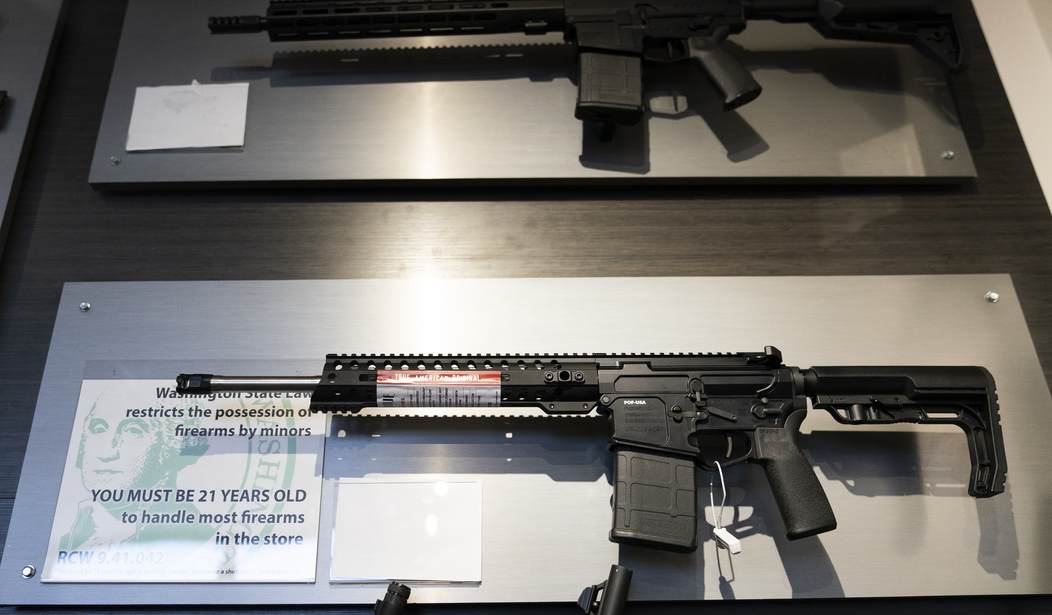The Supreme Court is already slated to hear oral arguments this fall on a challenge to the ATF's rule on treating unfinished frames and receivers as "firearms". There are also pending cert requests dealing with Mexico's lawsuit against U.S. gunmakers, Hawaii's prohibition on carry a firearm without a license, and the federal prohibition on gun possession for "unlawful" users of drugs for the Court to consider when justices return to D.C. in just a few weeks.
Now we can add an "assault weapons" ban to the Second Amendment cases the justices will be looking at in conference. On Wednesday, the Second Amendment Foundation and Firearms Policy Coalition officially filed their cert petition in Snope v. Brown (formerly known as Bianchi v. Brown), asking SCOTUS to finally address whether the Constitution permits the states like Maryland to "ban semiautomatic rifles that are in common use for lawful purposes, including the most popular rifle in America."
Dominic Bianchi, who was the named plaintiff in the case when it was filed, no longer lives in Maryland (and has hopefully moved to Free America where he can exercise his Second Amendment rights without restraint), but the case will continue with David Snope as the new primary plaintiff. Snope, like every other Maryland resident, is prohibited from purchasing (and possessing) any of the firearms the state of Maryland deems "assault weapons", and according to the Fourth Circuit Court of Appeals, that's okay because AR-15s and other semi-automatic firearms fall beyond the Second Amendment's protections.
In their cert petition, SAF and FPC note that the Fourth Circuit's assertion that semi-automatic long guns are "like" machine guns, and can therefore be banned at the whims of the state or federal government, "unfortunately is becoming a commonplace misapplication of this Court’s precedents."
That lower courts are determined to uphold bans on common firearms is not a new problem, and this flawed line of reasoning is only its most recent manifestation. Following Heller, there were many challenges to similar bans on types of firearms but time and again—usually through the application of intermediate scrutiny—those laws were upheld. Then, in New York State Rifle & Pistol Association, Inc. v.Bruen, 597 U.S. 1 (2022), this Court made explicit that interest balancing is off the table and that laws infringing the plain text of the Second Amendment may be upheld only if the government proves that the challenged law is consistent with the Second Amendment as originally understood. The intermediate scrutiny approach was therefore repudiated.
In their efforts to find a new standard through which to uphold laws banning certain types of firearms, the circuit courts appear to be coalescing around the rationale offered by the Fourth Circuit. Several other courts in the past year have similarly suggested that firearms that are, in a court’s estimation, too like firearms used by the military may be banned, whether as a matter of text or history. These arguments are noteworthy for the way that they flip Heller on its head. In Heller, this Court rejected the argument that handguns could be banned from private use because the Second Amendment protected only ownership of firearms in connection with militia service. The Court held that the Second Amendment did not only protect the use of arms for militia purposes but rather for all lawful purposes, including individual self-defense. The decision below, like other decisions embracing the same rationale, reads Heller’s interpretation of the Second Amendment as protecting individual self-defense as a limit on the scope of the Amendment’s protections, effectively reading the Amendment’s stated purpose of preserving the militia out of the Constitution altogether.
The scope of our Second Amendment rights must, by necessity, include arms that are appropriate for service in a militia. But as the Court pointed out in Heller, the right isn't exclusively reserved for militia members. It is a right of the people, and while self-defense may be the core purpose of the individual right, it encompasses all lawful uses of firearms.
The Fourth and Seventh Circuits have tried to get around the Court's precedental decisions by casting AR-15s and other semi-automatic firearms as too close to military weapons to be included in the Second Amendment's protections, which is, frankly, an absurd argument. For most of our history, there was no difference at all between the arms used by the military and those available to the citizenry. Usefulness in military service cannot render arms outside the scope of the Second Amendment without rendering that right a dead letter entirely.
The Supreme Court has also held that arms that are "dangerous and unusual" may not have Second Amendment protections, but the AR-15 and other semi-automatic firearms are hardly "unusual". As SAF and FPC argue, they're the most popular long guns in the country. The National Shooting Sports Foundation notes there are more modern sporting rifles in private hands than Ford F-150s on the highways, and no one would call that make and model of truck "unusual".
But those facts don't guarantee that the Court will grant cert to Snope. We don't have a split in the lower circuits when it comes to the constitutionality of "assault weapon" bans, largely because only a handful of states have adopted them. SCOTUS typically likes to see a circuit split before granting cert and deciding a particular issue, but as SAF executive director Adam Kraut said after the cert petition was filed, "Certiorari is required in this case to correct an increasingly widespread misunderstanding of the Supreme Court precedent, and the Second Amendment, itself."
Now that the cert petition has been filed, the state of Maryland has about a month to file its response. The Court could take up Snope in its first conference of the fall term on September 30th, but I wouldn't be surprised if the justices don't consider the case until later in the fall. If they do grant cert and accept the case, look for oral arguments to be scheduled in the spring, and we could get a decision by next June.









